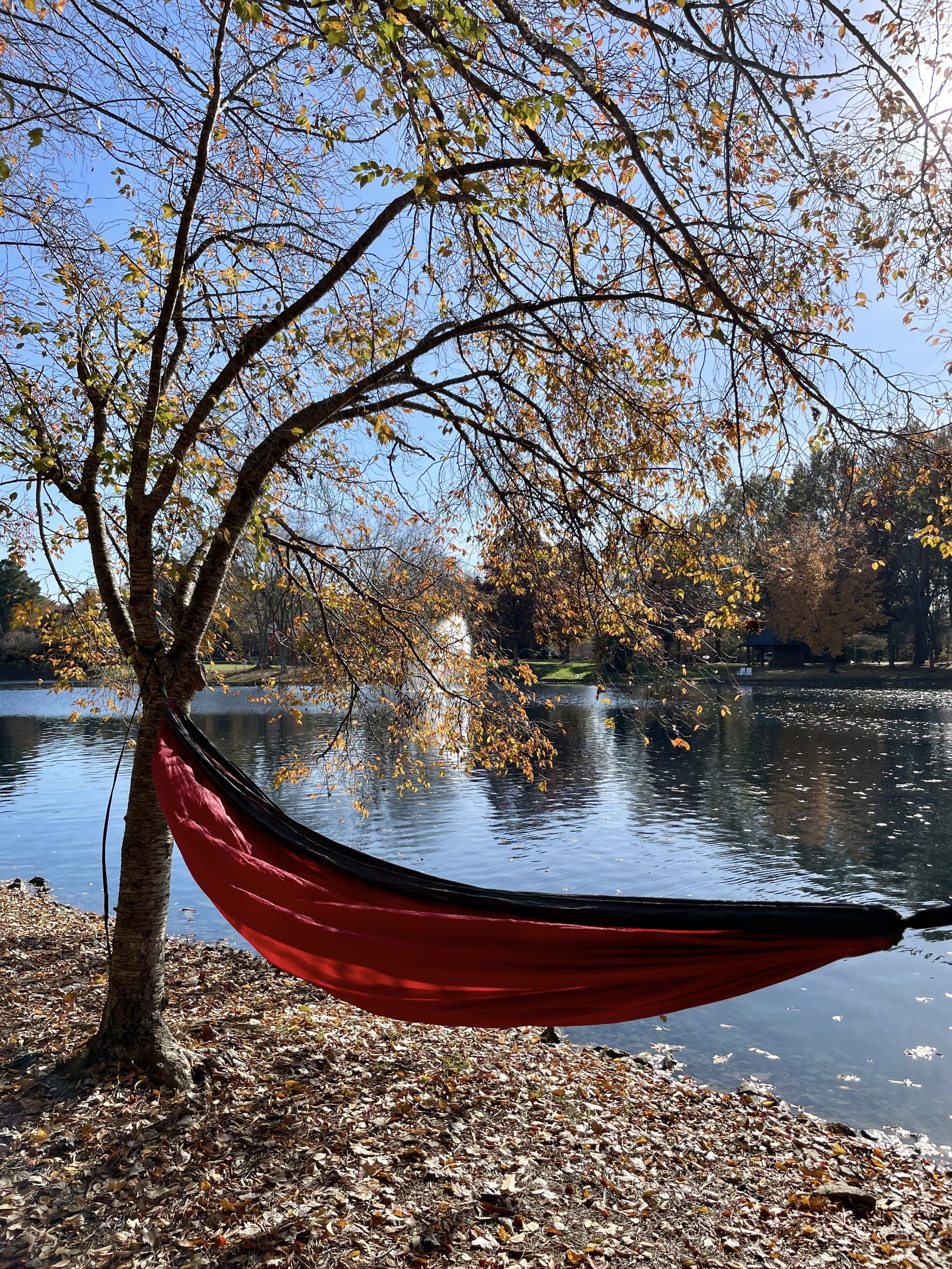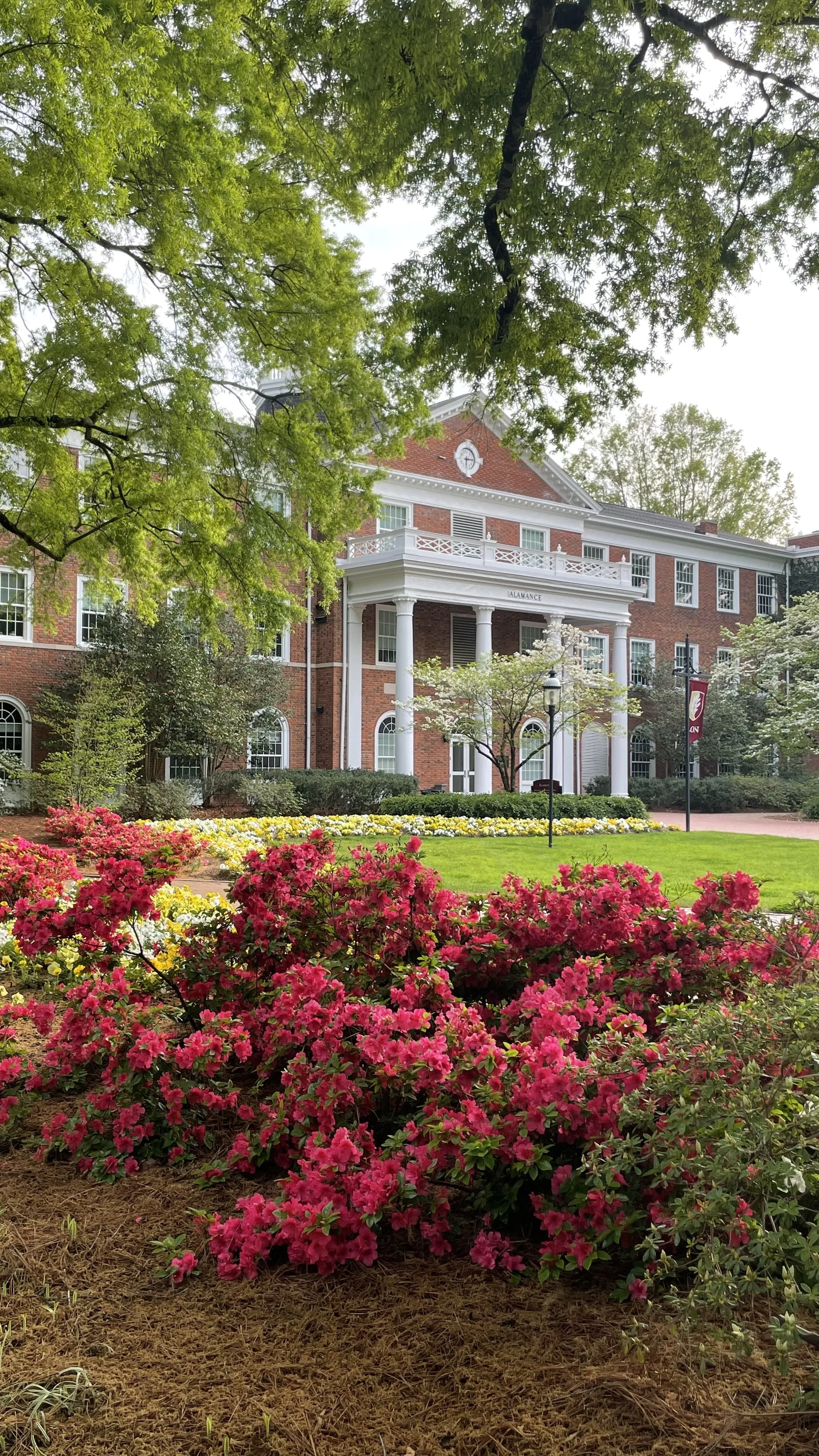American impressions: Elon University
Reflections on my time as a Fulbright Visiting Scholar at Elon University, North Carolina.
1. Elon University · 2. Flora and fauna · 3. Teaching technology ethics · 4. The sport · Coming soon: 5. Fulbright · 6. Life in the North Carolina Piedmont · 7. Future of the nation.
First: no relation. Elon University’s misfortune to share a name with that man renders most of its merch unwearable. Dreading having to tell people I’m not advertising the world’s richest edgelord, I insist any item I buy also carries the word ‘University’.
The other thing people know Elon for, correctly this time, is its campus. The grass is flush and hillocky like a resort fairway, studded with cartoon-bright flowers. Buildings are neoclassical: porticos and atria, white paint and red bricks in which students pay to have their names immortalised. The lake has ample shade. There are hammocks and cygnets. Soft drifts of blossom in overlooked corners are the only hint of disorder.
Elon University is curated. The campus is itself a brochure as much as a site of learning, with the bubblier students employed as tour guides for binder-clutching high-school seniors and – equally important, you sense – their parents. The excellent, cheap dining halls are an important stop-off. Again: curated. The university understands the value of student experience, both current and future.
It is also expert at juicing alums and parents for donations. I joke to folks back home that even the fire escapes have plaques: Thanks to the Kind Generosity of Doug and Michelle S—, Class of ’09. Mystifyingly, someone thought Margaret Thatcher was the right person to open the new student centre in 1995, so her name too is stamped in iron.
Elon’s story is one of bouncebacks. It burned down almost entirely in 1923, inspiring its mascot today, the Phoenix. But the 1970s found Elon College poorly run and academically sluggish. Its subsequent turnaround – and universitification – raised administrative eyebrows nationwide and inspired a book, Transforming a College. The secret sauce: a focus on teaching, which now sees Elon ranked #1 in the US for undergraduate tuition.
Whatever else my future holds, I want to teach. So given a chance to sharpen my skills, assembling a syllabus from scratch, teaching and assessing a cohort for several months, and learning from peers at the top of their pedagogical game, how could I say no? I’m also intrigued by the promises of the US liberal arts system.
‘The main job of a liberal arts college, it seems to me… is to allow a heroic narrative of the self to be written, so that in subsequent years there are the remains of a proud monument against which the sands of life can wash up.’ —Lydia Millet.
With campus living, small classes, and a broad four-year curriculum, the intention seems to be to disgorge rounded, thoughtful graduates, not mere workers. So I find myself arriving at Elon all in on lofty ideals. I hope to truly know my students and yes, maybe even influence the occasional heroic self-narrative.
The university has given me a place to live, a house it owns up the road. Pollen-tinged clapboard and screen doors; a small porch with paint peeling from the handrails. Its layout is faintly Escheresque – doors into doors into doors – and former residents agree it’s a little haunted for sure, but it’s spacious and the AC works great and it’s free. The washing machine and dryer are revelations, leaving clothes bone-dry and creaseless at impossible speed. I can only assume these miracle contraptions use amounts of energy that make them illegal in Europe. My office is twenty minutes by foot, for which a sidewalk is available – a rarity around here. (I wouldn’t be surprised to learn the university funded it.) I also get the keys to what staff affectionately dub ‘the boat’, a 17-year-old Chevy Impala with 120,000 miles on the clock. The first car I’ve ever had. I drive it as little as possible.
Elon U is in North Carolina but not of North Carolina, with most students from affluent Northeastern stock. I can see why they’re seduced – great weather, idyllic campus life, Southern hospitality – although the ‘Greek life’ of frats and sororities, also somehow key, is rightly opaque to me. Before term begins the corridors are conquered by squealing young women dressed in outdated frocks, taking part in the sorority recruitment cycle. It also becomes clear the student body is politically inert. Marches and encampments at universities across the state and nation protest the horrors of Gaza, but only in early May do I hear a mutter of dissent from Elon students. Then term ends and everyone goes home.
Faculty and staff are deeply competent and near-sickeningly welcoming. When there’s a snag with accommodation, another professor – a man I’ve never met – puts me up in his elegant home for a fortnight. I grow particularly fond of professors Derek Lackaff, who directs my interactive media programme, and Kenn Gaither, dean of the school of communications. Kenn is a deliberate man, his words worth waiting for, and he handles the occasional gripes of his staff astutely, balancing his obligations both down and up the chain. The admin-faculty antagonism so common in UK academia seems milder here at least.
Everyone warns me Elon is an easy place to be busy. I set out spongelike anyway. I attend workshops at the conjunction-heavy Center for Advancement of Teaching and Learning and the (re)launch of Elon’s Imagining the Digital Future Center. My own school of communications is genuinely interested in students’ pathways to industry, hosting Figma workshops and helping seniors run a local AIGA chapter. But it’s the non-denominational gatherings that are the most charming. The Strawberry Festival comes with plant donations and queues for free ice-cream. At the Maker Fair students show off ingenious textiles, stickers, and robots. The physics department hosts a viewing of the solar eclipse – 81% in Elon, disappointingly unnoticeable in mise-en-scènic practice – showcasing technology both high (refracting telescopes) and low (colanders). A physics grad myself, I chat with excited professors about how the shadows are getting sharper: with the moon sliding across its face, the sun becomes more a point source than a extended source.
Interrupting my fairly successful career (temporarily or otherwise, I’m still not sure) leaves me feeling vulnerable right now. Desperate for a break from the treadmills of commerce and the ironies of online living, my guard is lowered. It feels, then, almost as if Elon has targeted my weak spots. It’s a university that knows what it’s for and leans into that role with a touching earnestness. Students are given an acorn on their first day, and a sapling upon graduation – hokey, yes, but a perfect example of the place’s sincerity. Sometimes, if the planets align, you end up where you’re meant to be.





